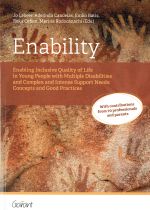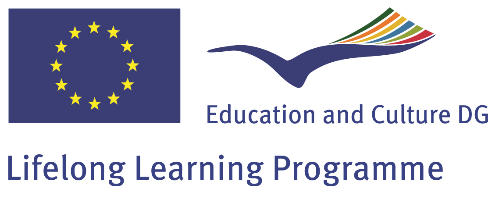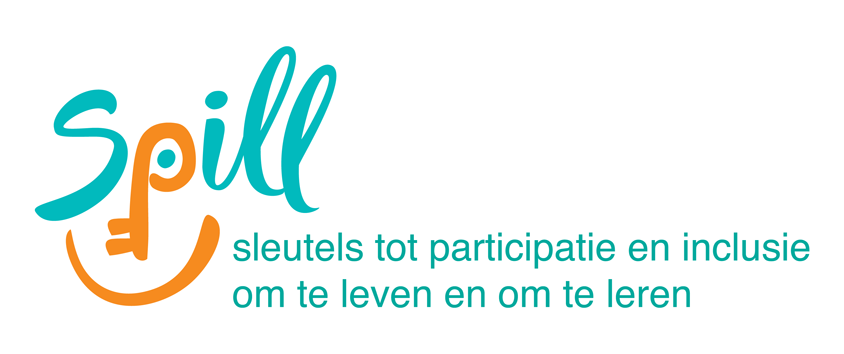 Enablin + has two meanings: “enabling” means “to enable someone”. It is the opposite of “disability”. The “in” stands for “inclusion”. The aim of the project was to enable young people with complex and intense support needs to live a less passive and more inclusive existence. It was a European Leonardo project (1/1/2014-30/6/2017) with 8 European partners (NL, BE, FR, RO, BG, PT, IT), led by the University of Antwerp, with the aim of design and test an interdisciplinary training for different professional groups working with children with severe multiple disabilities, with an emphasis on inclusion, quality of life, communication, activation, adaptability. To this end, Enablin + carried out a needs assessment, researched examples of good practice regarding inclusion and possible activities, developed an in-service training and organized a train-the-trainers course
Enablin + has two meanings: “enabling” means “to enable someone”. It is the opposite of “disability”. The “in” stands for “inclusion”. The aim of the project was to enable young people with complex and intense support needs to live a less passive and more inclusive existence. It was a European Leonardo project (1/1/2014-30/6/2017) with 8 European partners (NL, BE, FR, RO, BG, PT, IT), led by the University of Antwerp, with the aim of design and test an interdisciplinary training for different professional groups working with children with severe multiple disabilities, with an emphasis on inclusion, quality of life, communication, activation, adaptability. To this end, Enablin + carried out a needs assessment, researched examples of good practice regarding inclusion and possible activities, developed an in-service training and organized a train-the-trainers course
Project results
1. Enability. Enabling Inclusive Quality of Life in Young People with Multiple Disabilities and Complex and Intense Support Needs: Concepts & good practices

2. Training process book & DVD



A 110-page training manual in 8 languages, for educators and students, with a training proposal, examples of good practice, explanatory texts and reflective questions, + a DVD.
The DVD contains films (with English subtitles) about examples of good practice in the Netherlands, Belgium, France, Réunion, Bulgaria, Italy and Portugal. These examples are intended for training purposes and are not freely accessible, except for some videos from the Dutch Together to School-classes
How to cite: Lebeer, Jo, Nijland, Mia, Grácio, Luisa, Schraepen, Beno (Eds) (2017) Enabling Activity and Participation. Supporting Young People with Complex and Intense Support Needs: process book and DVD. Varna (BG): Helix Press & Enablin+ Project. ISBN 978-619-7147-16-2
Download a pdf of the training handbook Nederlands – English – Français – Italiano – Portugues – Hungarian – Romanian – Bulgarian
Paper copies can be ordered in English or French at the price of 20 € + shipment costs by sending an e-mail request to spillvzw@gmail.com
3. Report of Needs’ Assessment Research
Who are they? People with complex and intensive support needs? This report describes the results of a European survey on problematic issues related to living conditions, care and education of children and young people with complex and intense support needs. Download the full report here in English or French
4. Report Continuous Support Systems and Examples of Good Practice
This report describes current continuous support systems for children and young people with complex and intensive support needs, at different age levels (early intervention – pre-school age – school age), in eight European countries. It also describes some examples of good practices that combine appropriate support with initiatives for inclusion, activation and participation in education and other areas of society. Download it here: full report in English, or résumé en Français.
5. Report Try-outs of innovative in-service training
Based on the needs assessment, a transdisciplinary modular training was developed in the following topics: (1) quality of life and assessment of children’s support needs (2) communication; (3) fundamental attitudes and concepts related to learning, development and inclusion (mediation and instruction) (4) education (special and inclusive); (5) difficult-to-understand behavior, prevention and regulation; (6) basic self-care skills (nutrition, toileting, others); (7) how to organize a continuous support system, burnout prevention, ethical issues. Each partner organized a series of in-service training modules with professionals and parents, addressing a number of themes around promoting inclusive activities and participation of children with complex and intensive support needs. This resulted in a range of different initiatives, adapted to local needs and possibilities. You can download a report in English here.
6. Train-the-trainer course
In September 2016, a train-the-trainers course was organized in Milan for 50 participants, with workshops on inclusive education, health care, ethics, communication, challenging behaviour. The abstract book of this train-the-trainers course is available in English or Italiano.
7. Overview of the Enablin+ project
A report with the project’s overview can be downloaded . There is also a report of the external evaluator of Manchester Metropolitan University
Projectpartners
 |
|||||||
| University of Antwerp, Project of Learning Enhancement & Inclusion Doornstraat 331 – 2610 Wilrijk |
Expert Centre Care & Education – Wijhe |
Comité d’Etudes, d’Education et de Soins Auprès des Personnes Polyhandicapées CESAP – Paris |
Babes-Bolyai University, Department Applied Psychology – Cluj-Napoca |
Association St-François d’Assise – Pôle Handicap – Ste. Suzanne |
Karin Dom Foundation – Varna |
Don Carlo Gnocchi Foundation – Vismara Rehabilitation Centre – Milano | Universidade de Evora – CIEP Centre for Research in Education & Psychology |
| Belgium | The Netherlands | France | Romania | Isle de la Réunion | Bulgaria | Italia | Portugal |
Each partner worked in its own region with a local/regional/national network, made up of vocational training providers (in a lifelong learning system); service providers and parent organizations. The Enablin + Consortium collaborated with other experts involved in targeting children with severe multiple disabilities, e.g. the Special Interest Group of the IASSID (International Association for the Scientific Study of Intellectual Disabilities); specialists in alternative communication (members of ISAAC, such as Comalso asbl and Modem in Belgium); expert centers such as Multiplus (KU Leuven); SUSA (Université de Liège, de Mons); parent associations AP3, Inclusion Flanders, APHM in Belgium; Rett Syndrome Association of Parents in Different Countries; Inclusion International; Réseau Lucioles in France, ’s Heerenloo Netherlands, etc.
Why a project like Enablin+ is needed
Children and young adults with complex and intense support needs (CISN), more commonly known as “children with PIMD” (Profound Intellectual and Multiple Disabilities), are difficult to categorize. Indeed, they have multiple needs: inclusive education seems very difficult – you hardly will see them in regular schools -, they need a lot of care and attention, the staff is usually poorly prepared and they also are a big challenge for parents. According to the 2006 United Nations Convention on the Rights of Persons with Disabilities, countries that have ratified this Convention now have a duty to “de-institutionalize”, i.e. to organize the possibility of including children with disabilities in normal schools and to promote inclusion in all areas of life. This is not obvious, especially for young people who have severe and multiple difficulties in daily activities such as self-care, learning, communication, mobility, and in participating in education or other activities.
First, these children often do not receive adequate early intervention and parental support; later they are often taken care of in separate environments. In some countries, education is very rudimentary. A common complaint is that there is never enough staff. Inclusion policy is still lacking. In most countries, except Italy, Norway and Portugal, they are usually not integrated into mainstream environments. Dedicated professionals who support or teach these children know little about the means or ways to help these children in mainstream schools or other inclusive settings. Parents need help. Another reported problem is the excessive passivity of children with severe intellectual disabilities. Staff and children from regular schools are not used or willing to take care of these children.
The reason why these situations persist can be found in a lack of belief that it is possible and worthwhile to activate children, even with severe intellectual disabilities; that it is possible and worthwhile to take inclusive initiatives and that in the long term the quality of life of everyone (including those who support them) can be improved. Other reasons why the target group is usually neglected in training initiatives may be that they do not represent economic power and that it is easier to provide passive care than active involvement.
De-institutionalization must be accompanied by training for all concerned, and at all levels. People who work with children and young people with intensive care needs are insufficiently trained during their basic training. This happens at all levels: in vocational education, at university and colleges. In addition, once on the job, other training needs arise on the job. There is a need to develop a system of lifelong learning in the workplace. People do learn different techniques in their basic training, but what is missing is a basic attitude and belief system, that it is important to activate the children from an early age to give them experiences that they believe they can learn; that people have a curious, explorative attitude to look for solutions that work, that it is important to participate as much as possible in life’s opportunities, to go to an inclusive school, that the way you interact with these children matters is, etc. Therefore, training should also address views, attitudes and ethical issues, as well as practicalities.
To achieve this goal of inclusion and activation, there is a need for transdisciplinary collaboration of all parties involved: parents, teachers, daily life support staff, medical and rehabilitation staff, and vocational trainers. Solutions that have proven their effectiveness – inventions of professionals or parents – often remain very local due to language and organizational barriers. Local organizations could thus benefit from an exchange at European level. To achieve this goal, collaboration between parents and professionals needs to be strengthened and training models developed that are useful for support staff, mainstream education staff and parents. Hence the name “ENABLIN +”
Who can benefit from Enablin+ ?
The Enablin+ project is aimed at people who work/live with children and young adults with complex and intensive support needs. These children have severe and multiple disabilities in activities and participation in self-care, education, communication, mobility and leisure. They are very dependent on care and support, and often 24/24. Often these children are referred to in the English literature as “PIMD – Profound Intellectual and Multiple Disability” or “Polyhandicapés” in French. We preferred to broaden the target audience, more in terms of their need for intensive support, which not so much with the medical situation, but more with the disabilities, so this project is aimed at children with severe multiple disabilities, who have a combination of pronounced disabilities, which seriously jeopardize their development, causing them serious difficulties in the learning process and in participating in the different contexts they live in: education, family and community. All staff and parents are involved: primary and special education staff, personal assistants, support staff, parents, medical & rehabilitation staff, representative organizations for people with disabilities, vocational trainers at the level of secondary and continuing vocational education.
What do we want to achieve?
- Improve the quality of life of children and young adults with complex support needs through greater educational and social inclusion, better adapted and more activities, more opportunities for learning and development; by making those who support them aware that it is possible and worthwhile to activate them, and by creating a change of mentality in that sense.
- Improve the quality of support and contribute to de-institutionalization and inclusion, by guiding parents and professionals working with children and young adults with complex support needs to enable a more inclusive and active life
- Develop interdisciplinary in-service training modules for professionals and parents working with this target group, to improve competences in cognitive activation, increasing autonomy, activities of daily living, communication, behavioral regulation and inclusive education
- Professionalisation of the staff of regular schools in taking care of children with complex support needs
- Strengthen the collaboration between parents and professionals
- Empower parents to be true full partners in all decisions and planning about their children, so that they are more assertive of their rights to full inclusion in society, and not be acted upon
Disclaimer
 This project received financial support from the European Commission from 2014-2017 within the Lifelong Learning Programme. Contract no. 541981-LLP-1-2013-1-BE-LEONARDO-LMP. The content of this publication is the sole responsibility of the editors and publisher and the European Commission cannot be held responsible for any use whatsoever of the information contained herein This project received financial support from the European Commission from 2014-2017 within the Lifelong Learning Programme. Contract no. 541981-LLP-1-2013-1-BE-LEONARDO-LMP. The content of this publication is the sole responsibility of the editors and publisher and the European Commission cannot be held responsible for any use whatsoever of the information contained herein |
